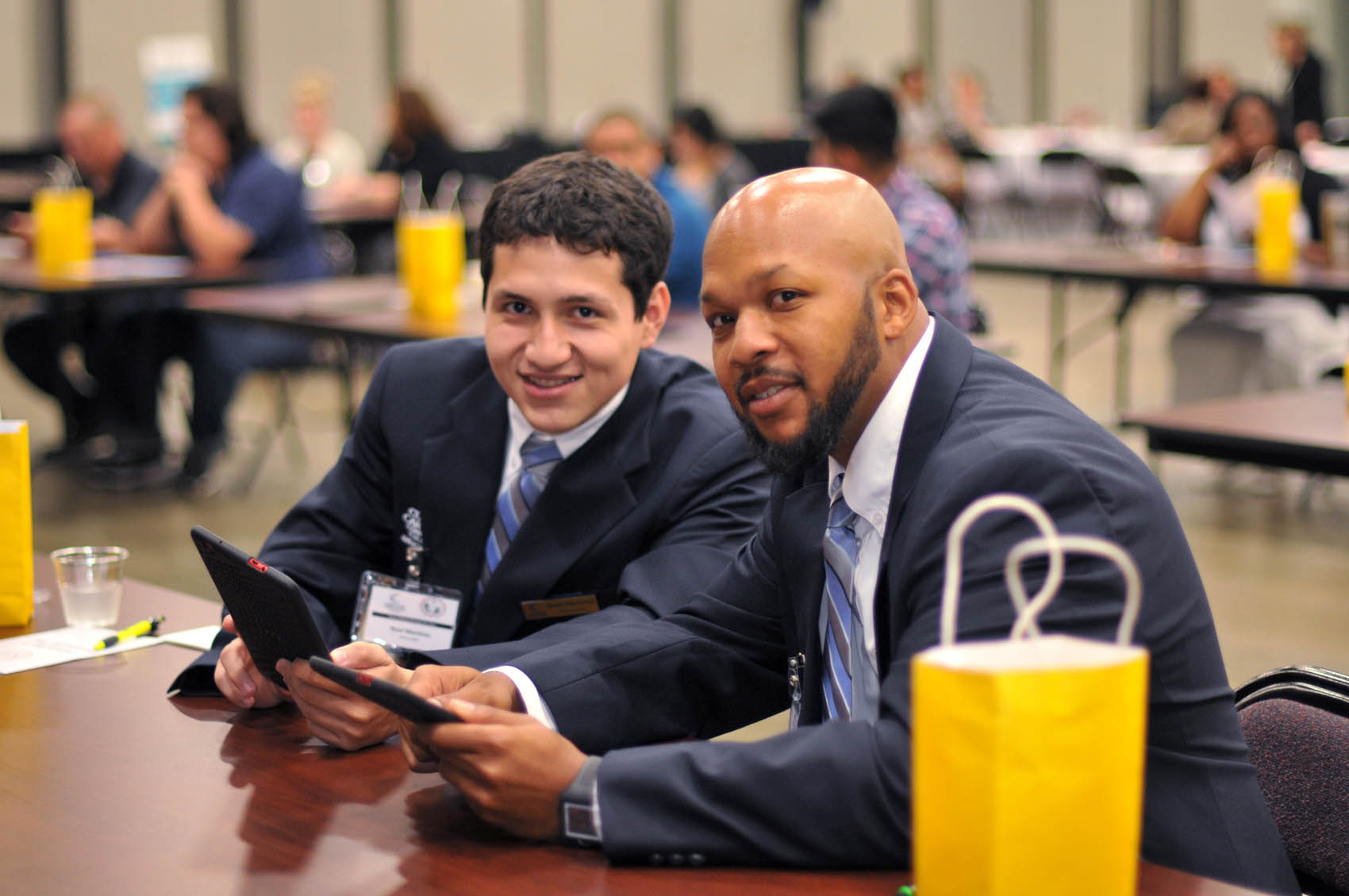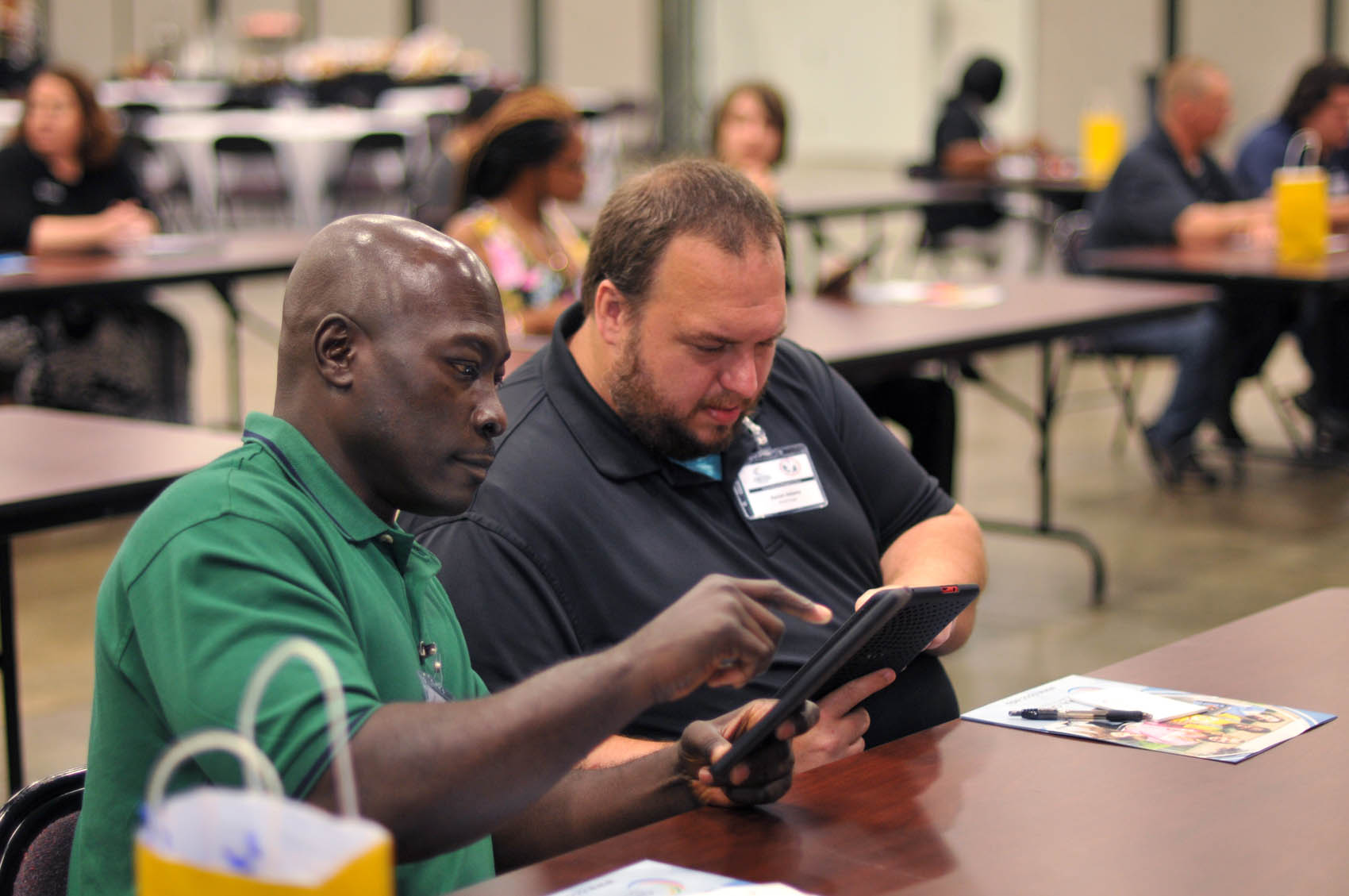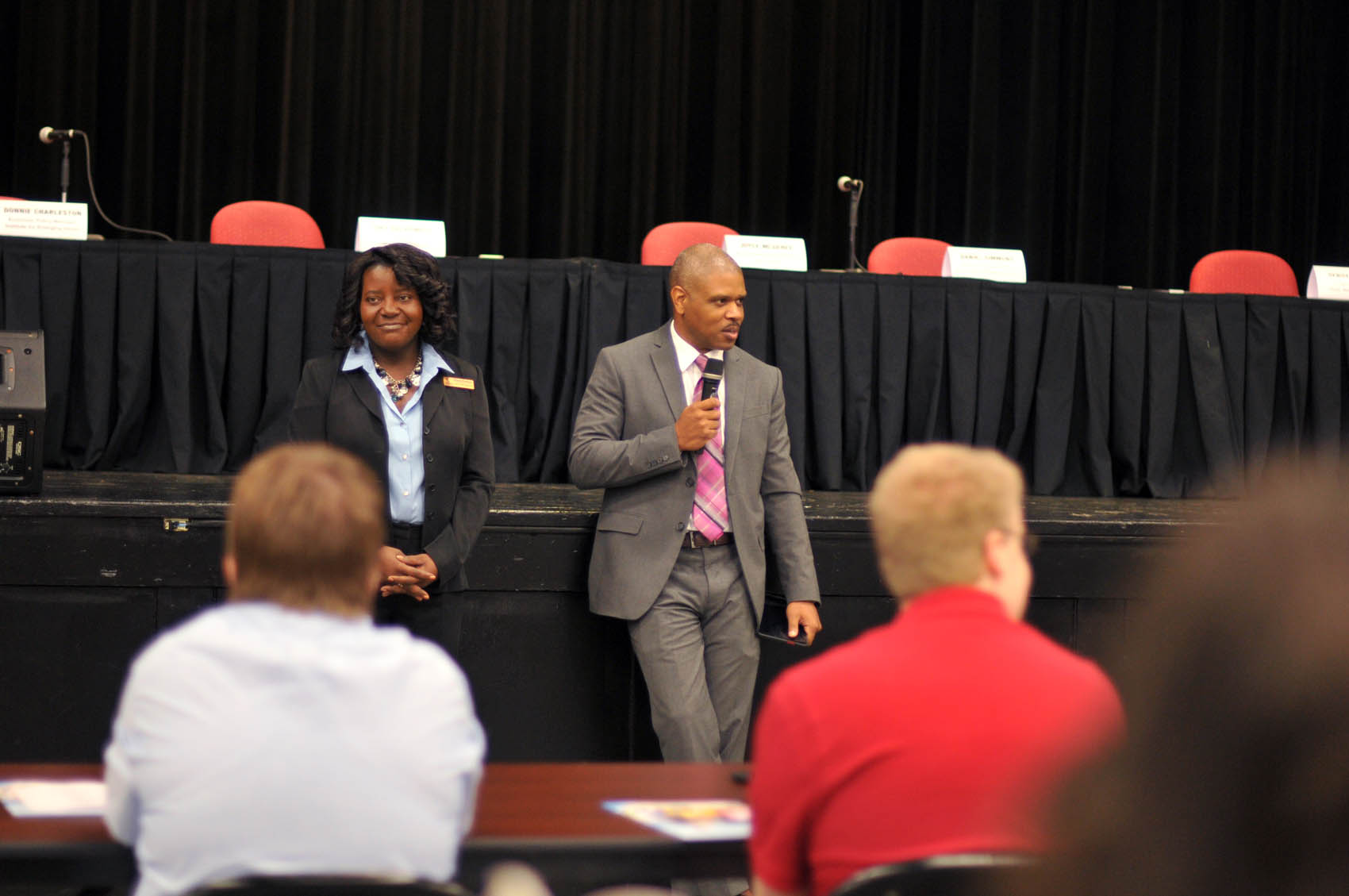College News
CCCC hosts FutureWork Prosperity Tour
Notice: This article is older than 12 months. Names, contact information, programs, titles, etc. might have changed. If you have any problems please call the main college number, 1-800-682-8353, and we will be happy to direct you accordingly.

click image to enlarge ⊗
Central Carolina Community College students Noel Martinez and Rasheed Jones participate in the FutureWork ... (more)

click image to enlarge ⊗
Central Carolina Community College students Christopher Barnes and Morgan Adams participate in the ... (more)

click image to enlarge ⊗
Participants in a FutureWork Prosperity Tour 2016 panel discussion on Wednesday, June 22, included ... (more)

click image to enlarge ⊗
Mary Parker, CCCC Career Center Coordinator, and Donnie Charleston, Economy Policy Manager, Institute ... (more)
06.23.2016 • College & Community • College General • Special Events
SANFORD - College students got a wakeup call about their economic prospects statewide and some advice for landing a job in the changing economy when the FutureWork Prosperity Tour rolled in on Wednesday morning, June 22, at the Dennis A. Wicker Civic Center.
The half-day stop hosted by Central Carolina Community College was part of a statewide tour organized by the Institute for Emerging Issues at N.C. State University. It was designed to explain economic shifts currently taking place in North Carolina and what that means for jobs in the years to come.
What kind of shifts?
The Institute predicts that demographic changes and technological innovation will affect the state's economy. Automation alone could eliminate 1.2 million jobs in North Carolina, with as many as 1.1 million additional jobs moving overseas as a result of what the Institute calls "technology-fueled offshoring."
The North Central Region -- a state-defined economic development area stretching from Lee and Harnett counties northward through the Research Triangle and up to the Virginia border -- is the least vulnerable of the state's eight regions. Still, the Institute projects that the region could lose 22 percent of its existing total wages -- or about $9.1 billion.
The presentation in Sanford opened with a discussion among Donnie Charleston, Economy Policy Manager for the Institute for Emerging Issues, and 20 CCCC students selected by faculty members from three technologically oriented academic programs. The give-and-take centered on the future for professional careers and how students can shape their own educational plans to the emerging economy.
"This is all about you guys," Charleston said, launching the discussion. "Don't be shy. Don't hold back. Tell me what you think."
Using tablets, students looked up jobs that interested them to assess the threat they face due to automation.
Charleston said dynamic jobs that require workers to adapt and find unique solutions had a brighter future because more repetitive, predictable work can be automated. That includes some jobs that may not seem obvious; even taxi and delivery drivers are at risk with driverless cars already on the road.
Students responded by explaining what they need to be successful. The discussion blended personal stories with policy ideas with the need for motivation and local job opportunities mixed in.
When one student mentioned having to spend so much time in school, Charleston delivered one of those wake up calls: Schooling, at least in the form of more training and earning advanced credentials, is now a permanent part of life. "We're going to have to be lifelong learning," Charleston said. "The reality is that, as the economy highly changes, you may be in a situation where you're going to be constantly retrained and go back to school."
For students attending Central Carolina Community College, the new reality came as mixed news. On one hand, they face some challenging job prospects. On the other hand, they're enrolled in a community college where they can get the education and credentials they need.
Morgan Adams, one of the students participating in the Prosperity Tour, worked in local industry before returning to school to study Laser and Photonics Technology.
Adams said he's glad that leaders are honestly acknowledging the volatile job scene and its potential impact on workers. Because of that volatility, he returned to school to get what he called "a true skill," something that would be marketable and help him stand out.
"In my opinion, some place like CCCC is invaluable," Adams said. "This is the place where decisions can be made halfway through your life to change directions and secure the future. With all of the programs that are offered, pretty much anybody can find something that would suit them and help them earn a living."
The tour stop concluded with a panel discussion where students and local civic leaders talked about creating and finding jobs in banking and finance, education, energy, government/smart communities and healthcare -- industries the Institute believes will become most important statewide.
Jerry Pedley, president and owner of Mertek Solutions in Sanford, said he enjoyed listening to the earlier session because his company designs and builds those automated machines that are transforming the economy. He outlined the kinds of people and skills his company needs -- and how the community college is helping students prepare for success.
"I sell robots and automation to people, and what we're really doing is creating better jobs, so we can all make that $50 an hour that you were talking about," Pedley said, referring to an earlier discussion. "So, robotics and automation are creating needs for more skills and higher paying jobs."
While the FutureWork Prosperity Tour could have stopped anywhere in the 15-county North Central Region, CCCC President Dr. T.E. Marchant said he was honored that event organizers chose Sanford.
"Central Carolina Community College is committed to providing our students with the greatest opportunities for professional success," he said. "This event, provided by the N.C. State University Institute for Emerging Issues, will provide our students with a great experience."
Many other local officials added insight as panelists: John Crumpton, Lee County Manager; Amy Dalrymple, Chair of the Lee County Board of Commissioners; Ken Hoyle, CCCC's Vice President of Student Services; Chet Mann, Mayor of Sanford; Denise Martin, Program Director for the CCCC Health Information Technology program; Joyce McGehee, Human Resources Director for Lee County; Mary Parker, Coordinator of the CCCC Career Center; and Daniel Simmons, Chief Professional Officer for the Boys and Girls Clubs of Sanford/Lee County.
After the morning's stop, attention in this North Central Region tour shifted to Apex, where elected officials, business leaders, and other stakeholders gathered for an evening presentation on public policy and how to prepare the region for changes on the horizon. By mid July, similar tours will have visited each of the state's eight economic development regions.
For more information on Central Carolina Community College, visit www.cccc.edu.
Categories
- Admin, Faculty & Staff Category
- Arts & Entertainment Category
- Clubs Category
- College & Community Category
- College General Category
- Continuing Education Category
- Curriculum Programs Category
- Distance Education Programs Category
- Facilities/Buildings Category
- Finances Category
- Foundation Category
- Graduations Category
- Lee Early College Category
- NCCCS Category
- SGA Category
- Special Events Category
- Sports Category
- Students/Graduates Category
- Uncategorized Category
Archives

